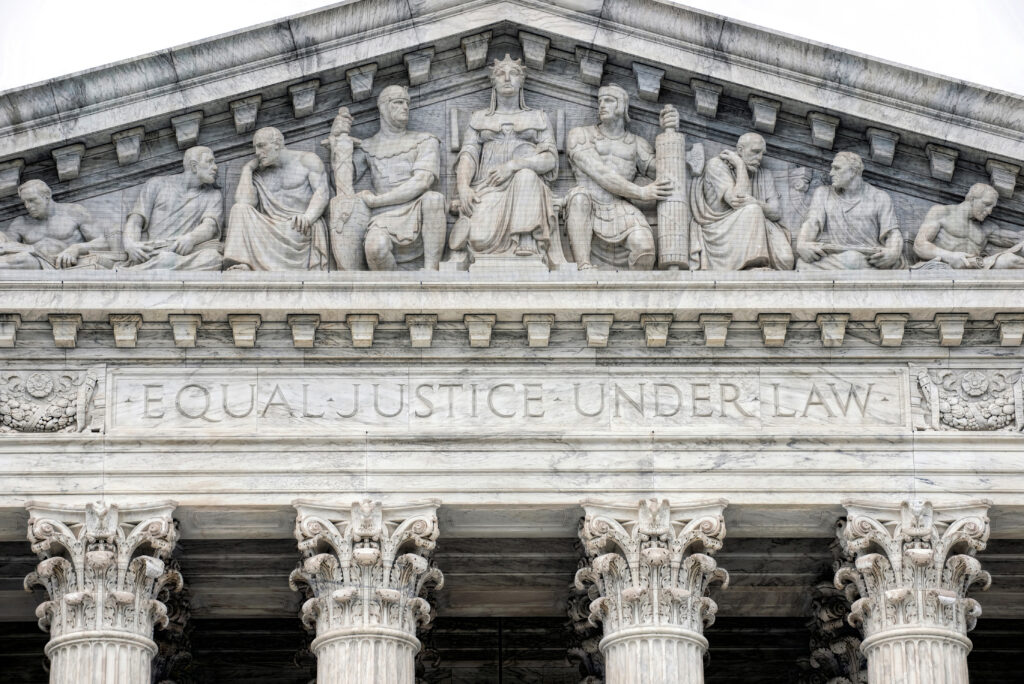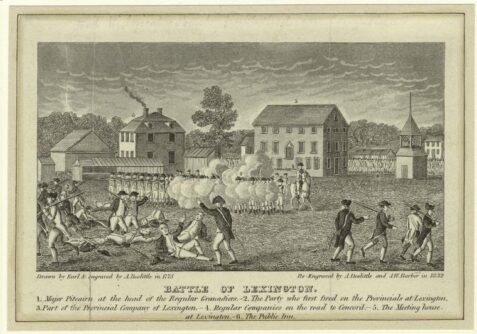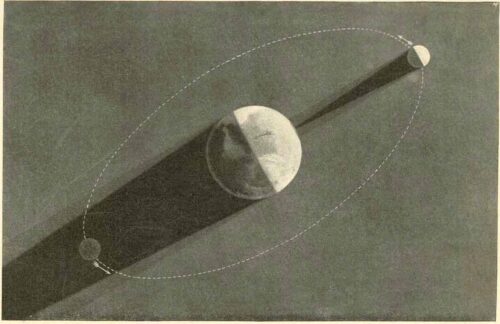The Supreme Court’s 6-3 decision in Americans for Prosperity v. Bonta marks an essential defense of donor privacy and, more importantly, civil society.
No good deed goes unpunished, warns the time-tested cliché. And don't donors ever know that to be true.
They have the wounds to prove it. Like the investor and the lover, the philanthropist will endure his share of disappointment. And de facto punishment. It may come in the form of the failed endowed project, the broken promise, the machinating trustee, the un-thanked gift, the unapproved redirect of charity dollars, of derailing circumstances, or other ways in which the buck given produces a bang insufficient (or non-existent)—and possibly accompanied by a slight, a nick, or even a stab.
And then there is a particular kind of punishment that is the special concoction of the partisan state, thrilled with its dabbling in the art of crypto-predestination. It is the kind of punishment that is spun by laws instead of a Ouija board, which cast the mere practice of philanthropic engagement as suspect. As a thing portending eventual misdeed, a thing pregnant with nefariousness, exposed by cocky, you-can’t-fool-me government workers who have bought into the contention that the giver’s pretense of selflessness masks selfishness.
Who knew that generosity would become a fixation for government over-reachers? Who would have believed that an emboldened prosecutorial class would claim with certainty that malfeasance and abuse of charity practices were so likely, and so egregious, that the state must respond (in advance!) by demanding intervention and oversight of an innocence that did not merit their presumption?
It’s all too true. The rationale justifying the regime’s big-footing—this busy-body big brothering, this ideology-driven rank partisanship housed in statutes, this constitutional aloofness—into the world of charitable giving and givers finds its mojo in anticipated, just-over-the-horizon lawbreaking. Hence: laws passed and prosecution prepared—by the offices and unlimited resources of the attorney general, no less—for eagerly awaited (predictable? probable?) bound-to-happen philanthropic missteps.
In practical terms, this governmental construct that puts charitable giving and nonprofits into the crosshairs can be reduced to that adage—the one that easily justifies about any and all expansions of the state—that grandmothers have spoken for ages: If you go looking for trouble, you’re gonna find it.
Actually, grandma meant it as a caution against excess.
Too bad the bureaucrats of California didn’t take that to heart: For some 15 years, they have been determined to find trouble in the details of donor giving, and in their drive to abrogate the right to donor privacy.
The tiger’s tail having been grabbed, what they experienced very recently in our nation’s highest court was jurisprudential comeuppance.
Went the day well? Nope: Those dabbling bureaucrats and their cause will none soon forget July 1, 2021. Indeed, it was as bad a day for them as it was a good one for donors, nonprofit charities, and the First Amendment. For on this day, the United State Supreme Court issued a historic 6-3 ruling that concluded a decade of costly legal turmoil, frustration, setbacks, and a future of fearfulness.
It was a day when a bullet was dodged. For if the High Court ruled otherwise, or had it chosen to not consider the appeal of Americans for Prosperity v. Bonta, Attorney General of California, America and Americans would have suffered a powerful blow to free speech and free association, the letter that important principle harbored in our Constitutional “right of the people peaceably to assemble.”
What was it that brought America’s donors and nonprofit associations—indeed, what brought all Americans—to the point whereby, but for six Supreme Court justices, a state intent on aggrandizing and on mischief making would have been allowed to push this nation to a brink of infringing critical rights?
The story that could have ended in a calamity for liberty, never mind the rights of donors, begins in that singular laboratory of statutory mischief, the California legislature—as partisan and ideological as one will find in the 50 states. Determined to press a priority bugaboo, leftist legislators, intent on finding novel ways to intimidate donors to those causes held as some variation of or whiff of “conservative,” contrived in 2004 to pass a new law that would expose wayward philanthropists—to put a name and a face to the buck donated—and empower the state Attorney General to oversee the snooping. From the California law:
The Attorney General shall establish and maintain a register of charitable corporations, unincorporated associations, and trustees subject to this article and of the particular trust or other relationship under which they hold property for charitable purposes and, to that end, may conduct whatever investigation is necessary, and shall obtain from public records, court officers, taxing authorities, trustees, and other sources, whatever information, copies of instruments, reports, and records are needed for the establishment and maintenance of the register. (Amended by Stats. 2004, Ch. 919, Sec. 5. Effective January 1, 2005.)
As interpreted by the state Attorney General, “whatever investigation is necessary” resulted in a requirement that charities provide the state and names of major donors on the “Schedule B” which attends the “990” federal tax form submitted annually by nonprofit organizations.
Numerous charities expressed no issue and complied by revealing the names of their donors. But as enforcement ginned up, and ensuing legal action commenced and widened and became more aggressive, many saw the California law for what it was: a threat to their right of association, and the free-speech rights of the donors themselves, who, outside of established legal precedent related to political-campaign giving, claim that donating anonymously is central to that right.
Americans for Prosperity and the Thomas More Law Center took to the courts to defend themselves, and their donors, from the aggression leveled by a succession of California AGs, who “threatened to suspend their registrations and fine their directors and officers” unless contributor identities were disclosed.
Over a number of years, the case ping-ponged between a district court—which held for the organizations—and the infamous federal Ninth Circuit Court, which ruled on behalf of the state.
Having exhausted all but the ultimate federal legal option, the defendants appealed to the United States Supreme Court in 2019, filing a “writ of certiorari” seeking a hearing and relief from the “blanket governmental demand for the individual identities and addresses of major donors to private nonprofit organizations . . . narrowly tailored to an asserted law-enforcement interest.”
Part of California’s justification for the statute was that the Attorney General would maintain the privacy of donor information it collected, pledging it would be inaccessible to the public.
And the sieve would hold water too: As the High Court agreed to hear the case, evidence emerged that California had, incredibly, posted thousands of the acquired, and supposedly confidential, federal tax forms on the Attorney General’s website. (In its cert petition, AFP revealed that one of its “expert witnesses also discovered that he was able to access hundreds of thousands of confidential documents on the [California Attorney General] website simply by changing a digit in the URL.”)
A coalition of otherwise strange bedfellows gathered to support AFP’s fight. The Hispanic Leadership Fund, in its amicus brief urging the High Court to take up the appeal, stated the widespread concern of nonprofits plainly:
HLF is interested in this case because, as a not-for-profit organization dedicated to public policy principles, it is distressed by the California Attorney General’s de facto requirement that all nonprofit groups turn over sensitive donor information. This sweeping and unjustified disclosure demand is especially disturbing to HLF because, over and over, States have proven their inability to keep nonprofit information confidential, thereby exposing the donors and members to violence, harassment, and economic reprisals, which ultimately discourages them from associating with nonprofits. HLF especially feels this impact given the organization’s focus on issues affecting minority communities. The importance of this case to HLF and other nonprofits simply cannot be overstated.
HLF is not known for hanging out at the same political bars as AFP. Neither is The Council on American-Islamic-Relations. No matter: It forcefully supported AFP’s efforts, contending that “The First Amendment limits government power to collect sensitive associational information. These First Amendment restrictions apply to governments alone: they are not dependent upon any risk of public disclosure or public harassment.”
The crowd grows. An alliance of organizations led by the American Civil Liberties Union, and including the National Association of Colored People, Human Rights Campaign, and PEN American Center, also weighed in against California. Its amici curiae brief held
The disclosure law at issue here, at least as it has been implemented by California, risks undermining the freedom to associate for expressive purposes. That freedom, in turn, is fundamental to our democracy, and has long been protected by the First and Fourteenth Amendments. A critical corollary of the freedom to associate is the right to maintain the confidentiality of one’s associations, absent a strong governmental interest in disclosure. If the State could categorically demand disclosure of associational information, the ability of citizens to organize to defend values out of favor with the majority would be seriously diminished. As this Court recognized in NAACP v. Alabama ex rel. Patterson, 357 U.S. 449 (1958), the compelled disclosure of an expressive association’s members or supporters threatens to chill free association, because people may refrain from exercising those freedoms rather than expose themselves to government reprisal or private retaliation.
Disclosure requirements that threaten to chill the exercise of First Amendment rights are subject to exacting scrutiny: the government must establish that the disclosure requirement is substantially related to a sufficiently important governmental interest to justify the attendant chilling effect. This is a sliding scale test that imposes a more stringent burden of justification on the government in direct proportion to the disclosure requirement’s chilling effect.
Among numerous other organizations and interests weighing in, Philanthropy Roundtable chose to highlight the need to protect a “robust civil society,” arguing in its brief
Amicus is concerned that the California Attorney General’s demand that protected and confidential personal information—including the names and addresses of donors—be turned over to the State implicates serious constitutional concerns. The State’s demand abridges philanthropic freedom, chills charitable giving, weakens the ability of individual donors and nonprofit organizations to carry out their goals and missions, and, therefore, abridges their freedoms of speech, religion, and association under the First and Fourteenth Amendments without articulating a compelling State interest. Amicus respectfully requests that this Court reverse the Ninth Circuit’s judgment.
California’s then AG—now HHS Secretary Xavier Becerra—countered the cert petition argument, contending that “California’s interest in policing charitable fraud and self-dealing is more than sufficient to justify any minimal burden on associational interests.”
Unmoved by such claims, the Justices agreed to the cert request of AFP and the Thomas More Law Center, and on April 26th, the full Court heard their appeal of the Ninth Circuit ruling (the oral arguments can be heard here).
On July 1st the bad news—for California—was formally delivered. On behalf of the majority, Chief Justice John Roberts (joined by Justices Kavanaugh, Thomas, Alito, Barrett, and Gorsuch) announced the ruling in favor of AFP . . . and in favor of civil society, associative rights, free speech, donor privacy, and much more, holding that “California’s blanket demand for Schedule Bs is facially unconstitutional,” and declaring its scheme for up-front collection of donor names to be “particularly dubious.”
(As partisan undertakings, masquerading as contrived legal justifications, are by their very nature.)
Reminding California bureaucrats that “the prime objective of the First Amendment is not efficiency,” the Chief Justice proceeded to defend the rights of donors, and to substantiate the fears leveled by nonprofits:
The Attorney General tries to downplay the burden on donors, arguing that “there is no basis on which to conclude that California’s requirement results in any broad-based chill.” . . . We are unpersuaded.
The gravity of the privacy concerns in this context is further underscored by the filings of hundreds of organizations as amici curia in support of the petitioners. Far from representing uniquely sensitive causes, these organizations span the ideological spectrum, and indeed the full range of human endeavors: from the American Civil Liberties Union to the Proposition 8 Legal Defense Fund; from the Council on American-Islamic Relations to the Zionist Organization of America; from Feeding America-Eastern Wisconsin to PBS Reno. The deterrent effect feared by these organizations is real and pervasive, even if their concerns are not shared by every single charity operating or raising funds in California.
We are left to conclude that the Attorney General’s disclosure requirement imposes a widespread burden on donors’ associational rights. And this burden cannot be justified on the ground that the regime is narrowly tailored to investigating charitable wrongdoing, or that the State’s interest in administrative convenience is sufficiently important.
In a concurring opinion, Justice Clarence Thomas made certain to highlight the integral aspect of anonymity that is contained in the First Amendment:
“The text and history of the Assembly Clause suggest that the right to assemble includes the right to associate anonymously. . . . And the right to associate anonymously often operates as a vehicle to protect other First Amendment rights, such as the freedom of the press. . . . Laws directly burdening the right to associate anonymously, including compelled disclosure laws, should be subject to the same scrutiny as laws directly burdening other First Amendment rights.”
The three dissenting votes—their minority view expressed in Justice Sonia Sotomayer’s opinion—saw no threat to liberty from California’s law and its application:
In sum, the evidence shows that California’s confidential reporting requirement imposes trivial burdens on petitioners’ associational rights and plays a meaningful role in Section attorneys’ ability to identify and prosecute charities engaged in malfeasance. That is more than enough to satisfy the First Amendment here.
So, the good guys won?
Yes, American for Prosperity Foundation v Bonta (the named defendant, Rob Bonta, who is California’s current Attorney General, holds the litigation baton passed on from several predecessors, including one who is now Vice President of these United States) was a victory, from any civil-society and First Amendment perspective. But it was also a legal bullet-dodging. Aside from the critical outcome rendered by the Supreme Court, a related question—why was the bullet fired in the first place?—should also prove to be a cautionary bracer to the friends of civil society.
Donors and doers must understand that, no matter how their donations, volunteerism, or charitable benefit to the commonweal, no matter their altruism, the law zealously adopted by California, and aggressively pressed by its executive branch, in open defiance of obvious liberties, deserves to be considered an affront, a threat, by those who comfortably and brazenly exert authority (over who? over you) via ever-centralizing government and regulatory activism that is little more than ideological projection. It comes at the expense of freedoms, and provides a true “chilling effect” on considered personal decisions—made by many individuals, from the widow placing the mite in the collection plate to the retiree altering a will to include a bounteous bequest—to share good fortunes in order to ensure the blessings of liberty for community and country.
Are these bureaucratic threats exclusively brewed in legendary back rooms and political ward offices staffed by schemers working from some Saul Alinsky playbook, by partisan hacks brewing plots after binging on Howard Zinn historical fantasies? No. Not exclusively.
One of the more important observations made by Alexis de Tocqueville in his classic work, Democracy in America, was that, even in democracies, centralization of power and authority is a natural thing, an evolving tendency:
I have shown that equality suggested to men the thought of a unique, uniform and strong government. I have just shown that it gives them the taste for it; so today nations are tending toward a government of this type. The natural inclination of their mind and heart leads them to it, and it is enough for them not to hold themselves back in order to reach it.
I think that, in the democratic centuries that are going to open up, individual independence and local liberties will always be a product of art. Centralization will be the natural government.
The pull is powerful. But then so was the genius in our Founders. In enshrining the First Amendment and its articulation of existing, natural rights, including that of peaceable assembly, they created the opportunity for a flourishing of what the French political philosopher aptly described as “local liberties.” In turn, these manifestations in neighborhoods and communities blossomed to the coasts, establishing America’s abundant and interwoven civil society—freely made by inspired men and women. In the whole, this amalgam of leagues and societies and parishes and clubs, of troops and orchestras and loyal orders has served as a vital check on democracy’s unavoidable, centralizing propensity.
That Chief Justice Roberts and five colleagues realized and directly addressed and protected the associative right—and thereby donor rights, and in turn the integrity of nonprofits dedicated to the commonweal—comes as both a relief to philanthropists small and large, and as a rebuke to those who are beholden to rights-abrogating, ideological extremism that is noxiously implemented through statutes and regulations.
In a time when all seems partisan and politicized, will this necessary and timely ruling soon prove to be of some rear-guard caliber?
That the High Court was moved to take action—chastening an important federal appeals court, along with state officials in remarkably high positions (who swore oaths to the same Constitution in which these associative rights are enshrined)—must serve the donor community as a hard reminder of current realities, especially political ones. And of this too: that the protection of rights, and the task of supporting the outlets of civil society that are embedded in our Republic’s essence, is a matter dependent on vigilance. There is no luxury of downtime.
The banding of unaccustomed brothers and sisters, rallying to fight with AFP and the Thomas More Law Center, is surely heartening. So too, at least for this moment, in the light of the consequential Supreme Court ruling, is the fact that America has been spared a punishing assault on doers and givers, on the men and woman of charity who make our society necessarily civil.
But . . . vigilance await.
(The Supreme Court website containing all briefs and other formal materials filed in Americans for Prosperity Foundation v. Bonta can be found here.)
Jack Fowler serves as director of The Center for Civil Society, which provides research, trainings, and other resources that offer practical advice, ideas, and tools to help civil society leaders achieve their missions. The Center will host its first in-person conference for donors in Scottsdale, Arizona on Wednesday, November 17, 2021. Sign up to receive updates from Jack and to learn more about the Center's work promoting charity and civil society.






